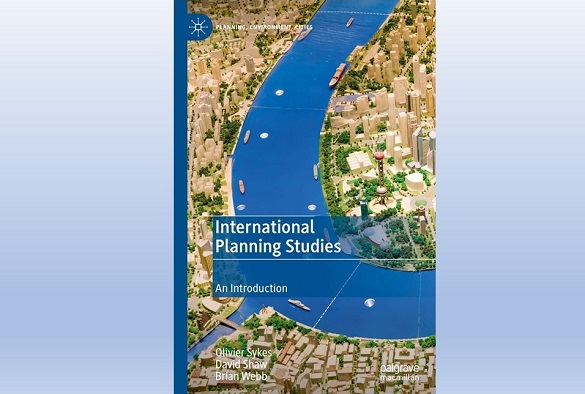This blog by Dr Olivier Sykes, senior lecturer in European Spatial Planning at the University of Liverpool and co-author of International Planning Studies, was originally published on Palgrave Social Science Matters:
The ‘urban century’ has brought renewed attention to urbanisation and the development of cities and regions across the globe. International planning studies is a rapidly evolving field which speaks to this context.
Much excellent work has explored planning from an international perspective focusing on comparisons between planning systems, the historical emergence of planning in different places, and contemporary planning challenges in different parts of the world. However, this has been fragmented across a range of academic papers, book chapters, and project reports, for example, from international organisations. What has been lacking is an overarching scholarly ‘take’ on international planning studies as a field of planning enquiry. Our book seeks to address this gap and provide a comprehensive introduction to international planning studies.
An international context for planning yesterday and today
In the book we situate planning as an international discipline and practice with an important role to play in delivering sustainable development across different scales in diverse global contexts. In many ways, planning has always striven to pursue such goals. For example, the arguments of social reformers and planners who promoted Garden Cities or the City Beautiful Movement at the turn of the twentieth century, find an echo in contemporary calls in international agreements like the UN’s 2030 Sustainable Development Goals and New Urban Agenda (NUA) for more attention and priority to be given to planning as a means of promoting sustainable and resilient communities. Mindful of the importance of historical awareness in international planning studies, we explore planning’s longstanding international dimension including the legacies and enduring impacts of colonialism, the emergence of modern planning from the nineteenth century onwards, and the international circulation of planning models in the second half of the twentieth century.
As we explore in the book, the way cities and urbanisation are planned and managed (or not) is today seen as being fundamental to wider multi-scale and cross-boundary agendas such as the climate and biodiversity emergencies. This places great attention and responsibility on planning and comes with significant opportunities but also challenges given the scale of the issues planning is being called upon to address. Contemporary themes of enquiry which can frame the investigation of planning from an international perspective are then covered. Here we stress there is no ‘set menu’ of themes and theories and that there are strong synergies and overlaps between ‘general’ planning studies and international planning studies. We also identify certain themes which we argue have particular salience for international planning studies, including globalisation, territorialism, concepts related to different state types and political legitimacies, and work around policy transfer and mobilities.
Characterising and comparing planning in different places
Because studying something involves thinking about the approaches one will take, we discuss research design and methodology in international planning studies, paying attention to some of the specific issues these raise. Ways to characterise planning systems are discussed next with an emphasis on the context-dependency that conditions how planning is organised and operates in different political, cultural, economic, and geographical settings. Such insights are central to what are sometimes termed ‘classic’ comparative planning studies of two or more countries.
Mind the ‘GAP’! – Planning above and beyond the state
Today, international planning studies can involve attention to new scales and forms of what we term ‘Planning above and beyond the state’. We explore these in two chapters. The first, ‘Planning Above and beyond the state (1)’, explores the emergence of a global agenda for planning (‘GAP’) under the auspices of the UN and its agencies, other international organisations and agreements, and professional and civil society networks and initiatives.
We discuss the resulting opportunities and challenges for planning in acting as a positive and influential agent of sustainable, resilient, and inclusive development. Key questions explored include the extent to which it is possible or desirable to try and define ‘universal’ concepts, models and standards for planning in a diverse world, whether statements of intent like the New Urban Agenda will have a material impact on planning ‘on the ground’, and how any application of their principles can be monitored. The following chapter on ‘Planning above and beyond the state (2)’ explores the influence of transnational and cross-border contexts on planning in different global regions, including the impacts of supranational regional cooperation initiatives and transnational development visions and corridors promoted by partnerships between states, or individual states.
Planning as an international discipline – key debates and future prospects
Finally, we consider the nature of planning as an international discipline across its practice, educational, and research domains and reflect on the future prospects for planning and international planning studies. We are aware there is a whole world of planning practice ‘out there’ and that one book cannot capture the rich diversity of planning experiences and stories. We hope, however, that the book will prove relevant and useful to those journeying into and through international planning studies. And also, that feedback from readers will point us towards further examples of planning systems and practices from around the globe.
Dr. Olivier Sykes is Senior Lecturer in European Spatial Planning at the University of Liverpool and Editor in Chief of Transactions of the Association of European Schools of Planning (AESOP). He leads the module International Planning Studies which received the 2014 AESOP Excellence in Teaching Award.
